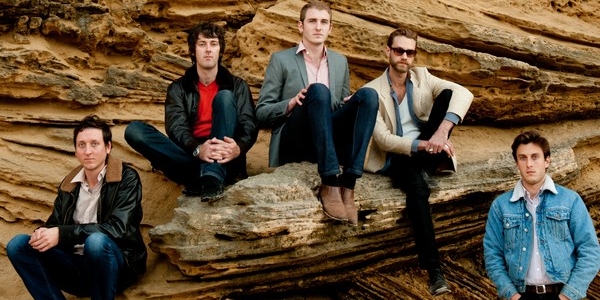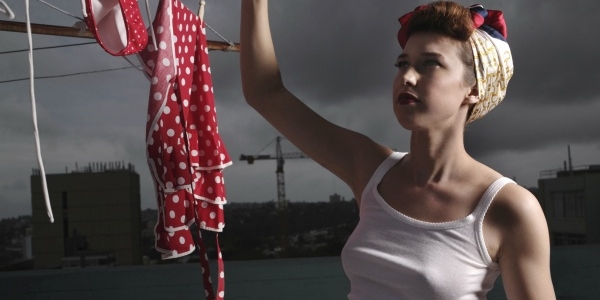“What drives me are the things that I’ve had a small taste of. It’s creating a song which you feel that you’ve nailed – which occasionally happens – and it’s hearing it out in the community. It’s hearing a song in a public place, in a supermarket, on the radio or on the television and feeling like what you’ve created – which you’re very proud of – is altering the atmosphere in some way. It’s out there, it’s part of it, it’s in people’s rooms and it’s part of life,” Jae muses. “I occasionally had that kind of feeling, the idea of a lot of people hearing your music is really exciting and I’m not sure if I can create what’s in my head and keep striving to do that; the idea that you have a large part of the population listening to it, and feeling passionately about, it’s exciting.”
His words are seemingly always delivered with sincerity and an underlying hint of humility. It’s almost as if he’s unaware that his band’s third record, 2007’s Cruel Guards, won the 2007 J Award as well as the 2008 ARIA Award for Best Adult Contemporary Album, reaching gold status within six months. Ever since their formation in high school back in 2002, The Panics, comprised of Jae Laffer (vocals/piano/guitar), Drew Wootton (guitar), Myles Wootton (drums), Paul Otway (bass/vocals) and Jules Douglas (keyboards/guitar/vocals), have released four albums and four EPs on their journey to becoming one of Australia’s most admired and talented indie rock bands.
“It’s not at a stage where I have to pinch myself of course. I mean I just feel like I’ve been given a great opportunity. We’ve stuck to our guns and haven’t compromised things that we work on. We’ve maintained a good sincere record that we’re very proud of. We’re not a big band but we’ve been given an opportunity where people take us seriously. Provided we can keep it going, I model our band on someone like REM where I want the seventh and the twelfth record to be as relevant as the second and the third. I just wanna make sure we keep the passion very potent and keep working because I’m just excited about the future and what we can create.”
The Panics’ latest album, Rain On The Humming Wire, written in Salford, England and recorded on the other side of the Atlantic in Woodstock, New York, was released a month ago to critical acclaim. Songs such asEndless Road, How Long and Walk That Mile Alone are indicative of a unifying theme throughout the album – a yearning for home and the longing for missed loved ones.
“We’ve moved around a lot the last couple of years. It’s strange and it’s only doing these interviews in the last couple of days that I kind of sit down and I have the record in front of me and I look at the song titles and I finally get a glimpse of feedback from people like yourself and you kind of look down…I realise the link when I sit down and talk about it, and I hadn’t really thought about that before, but there is definitely – if there is anything about the record which a theme – is it’s full of displacement. Homesickness is not the word; I don’t exist like that, I don’t exist in a world that is too hard to deal with in that term, I wouldn’t be on the path that I chose if it was a bother but I certainly feel I sacrifice certain things and I travel far and wide and it sometimes not til I’m very far away that I write with clarity perhaps and my brain just naturally goes right back to places in my childhood. I look back on different relationships and I put them in an environment that appeals to me and those environments are often back somewhere in the very quiet streets of Australia somewhere…There’s a definite longing about the record. There are characters that certainly don’t fit into the environment around them but they’re passing through and are small documents of life.”
Jae describes The Panics’ most recent tour as a means to “touch base” with different cities around Australia before the album’s release. “We’re basically starting some more intense tours through September, October, November. I’ve got like an office, at the moment I do nine-to-five days when I’ve got a day off. I work on demos and songs and things. I’m in an old bakery, upstairs, just overlooking some houses in Fitzroy so that’s what I do in my days off. I write these days because I’m going through a good phase. Basically trying to get the arsenal up for as soon as we get off tour; after having a few years in between this one [record] I don’t plan on waiting for the next one – I’m gonna make another one soon,” he reveals.
Maybe the key element to Jae’s songwriting success is his philosophy on making music. “You can’t fake it. If you don’t fake it, it just resonates and that’s the only one rule that I make sure to keep. It doesn’t matter to make hits or whatever it is, it’s just keep that going,” he explains. That seems to be a pithy and perfect explanation of the formula to their success. Their albums are just mere genuine explorations of their current lives and mental states, and by focusing on real emotions such as the feelings triggered by constant travelling in Rain On The Humming Wire‘s case, they defend against any possibilities of pretentiousness. Whilst Jae passionately expresses the excitement and importance of having The Panics’ music heard, there is a potential trap in becoming too conscious of your audience, which can perturb the creative process. However, it appears the band is experienced enough to understand the intricate balance between writing for an audience, and writing for themselves.
“The irony is…you have to strive towards your goals and what you want and the people you want to reach but it’s weird with songwriting because sometimes the less you think the more appeal it seems to have and you know that second nature thing, if you don’t put too much thought into it, it can be probably more natural and sincere and people seem to resonate about it. I don’t remember writing Don’t Fight It. It just happened in a twenty-second kind of bracket. It was one of those ones that was like ‘ah you know’ it was just kind of me pouring out a feeling at the time and you don’t think about it again. Sometimes it’s those that reach a bigger audience. I’m conscious of it, and I’d be lying to you if I’d said that there wasn’t something about reaching a large audience that wasn’t completely appealing to me. When you go through a period like we have with the last record when you totally find yourselves at festivals and stuff and a lot of people singing your song back at you – it’s a really powerful thing. I like that and I strive for that and it keeps me hungry but I’m not sure exactly how to aim for it.”







